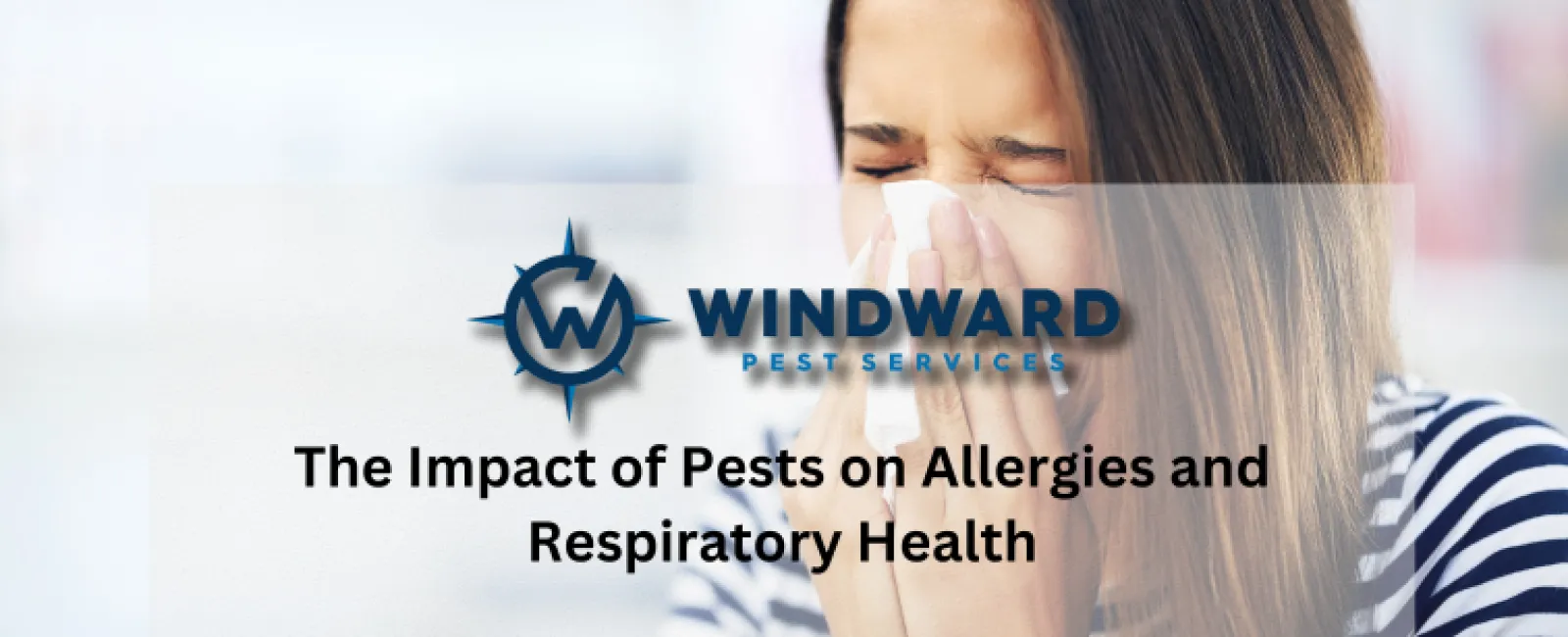Pests can be more than just a nuisance; they can significantly impact your health, particularly your allergies and respiratory system. Common household pests such as rodents, cockroaches, and dust mites are known to trigger allergies and exacerbate breathing problems. For residents in Atlanta, pest control measures, including interior treatments, are essential for maintaining a healthy living environment. This blog will explore the various ways pests affect respiratory health and offer practical tips for managing pest-related health risks.
Understanding the Connection Between Pests and Respiratory Health
How Pests Affect Respiratory Health
Pests can impact respiratory health in several ways:
- Allergens: Many pests produce allergens that can trigger allergic reactions and asthma. These allergens can be found in their droppings, saliva, shed skin, and body parts.
- Contaminants: Pests can contaminate indoor air quality by spreading bacteria, viruses, and fungi, which can exacerbate respiratory conditions.
- Irritants: Pest infestations can introduce irritants such as feces, urine, and debris into your home, which can irritate the respiratory system.
Common Pests and Their Health Impacts
Rodents
- Allergens: Rodent droppings, urine, and saliva contain proteins that can cause allergic reactions and asthma attacks.
- Contaminants: Rodents can carry and spread diseases like hantavirus and salmonella, which can affect respiratory health.
Cockroaches
- Allergens: Cockroach allergens are potent triggers for asthma and allergies. Their droppings, saliva, and shed skins are common indoor allergens.
- Contaminants: Cockroaches can spread bacteria and pathogens that can cause respiratory infections.
Dust Mites
- Allergens: Dust mites are microscopic pests that thrive in household dust. Their feces and body fragments are strong allergens and can trigger asthma and allergic reactions.
- Irritants: Dust mite infestations can exacerbate breathing problems, especially in individuals with preexisting respiratory conditions.
Mold and Mildew
- Allergens: While not pests in the traditional sense, mold and mildew can grow in damp, pest-infested areas. Mold spores are a significant cause of respiratory issues and allergies.
- Irritants: Mold exposure can lead to respiratory problems, including coughing, wheezing, and shortness of breath.
Signs of Pest-Related Respiratory Issues
Recognizing Symptoms
If you suspect that pests are affecting your respiratory health, look for the following symptoms:
- Allergic Reactions: Sneezing, runny or stuffy nose, itchy or watery eyes, and skin rashes.
- Asthma Symptoms: Wheezing, shortness of breath, chest tightness, and frequent coughing, especially at night or early morning.
- Respiratory Infections: Persistent cough, difficulty breathing, and symptoms resembling the flu or common cold that don't improve with typical treatment.
When to Seek Medical Attention
Consult a healthcare provider if you experience severe or persistent symptoms, particularly if you have a history of asthma or other respiratory conditions. Early diagnosis and treatment can help manage symptoms and prevent complications.
Effective Pest Control Measures
Importance of Pest Control Services in Atlanta
Professional pest control services are essential for effectively managing and preventing pest infestations. Atlanta pest control companies offer comprehensive services that include inspection, treatment, and prevention strategies tailored to the specific pest issues in your area.
Interior Treatments
Interior treatments are crucial for controlling pests inside your home. These treatments can include:
- Baiting and Trapping: Effective for managing rodents and insects.
- Insecticide Applications: Targeting areas where pests are known to harbor, such as baseboards, cracks, and crevices.
- Dust and Aerosol Treatments: Used to eliminate pests in hard-to-reach areas.
- Sanitation and Exclusion: Removing food sources and sealing entry points to prevent pests from entering your home.
DIY Pest Control Tips
In addition to professional services, there are several steps you can take to minimize pest-related health risks in your home:
- Maintain Cleanliness: Regularly clean and vacuum your home to remove food particles, dust, and debris that attract pests.
- Control Humidity: Use dehumidifiers and fix leaks to reduce moisture, which can attract pests like cockroaches and mold.
- Seal Entry Points: Inspect and seal cracks, gaps, and openings around doors, windows, and foundations to prevent pests from entering your home.
- Proper Food Storage: Store food in airtight containers and dispose of garbage regularly to eliminate food sources for pests.
The Role of Comprehensive Pest Management
Integrated Pest Management (IPM)
Integrated Pest Management (IPM) is a holistic approach that combines multiple strategies to effectively manage pest populations while minimizing the use of chemicals. IPM includes:
- Inspection and Monitoring: Regular inspections to identify and monitor pest activity.
- Preventive Measures: Implementing practices to prevent pest infestations, such as sealing entry points and maintaining cleanliness.
- Cultural Controls: Modifying the environment to make it less conducive to pests, such as reducing clutter and controlling moisture levels.
- Biological Controls: Using natural predators or biopesticides to control pest populations.
- Chemical Controls: Applying pesticides judiciously and only when necessary, following safety guidelines.
Benefits of IPM
- Reduced Health Risks: Minimizes exposure to harmful chemicals while effectively controlling pests.
- Environmental Protection: Promotes sustainable practices that protect the environment.
- Long-Term Solutions: Addresses the root causes of pest infestations, providing long-term control.
Addressing Specific Pest-Related Health Concerns
Allergies and Asthma
For individuals with allergies or asthma, it's essential to take extra precautions to minimize pest exposure:
- Allergen-Proof Bedding: Use allergen-proof covers on mattresses and pillows to reduce exposure to dust mites.
- Air Purifiers: Use HEPA air purifiers to remove allergens and improve indoor air quality.
- Regular Cleaning: Dust and vacuum frequently to reduce allergens.
- Professional Cleaning: Consider professional cleaning services to thoroughly clean carpets, upholstery, and other areas where allergens can accumulate.
Mold and Mildew Control
To prevent mold and mildew growth, especially in pest-prone areas:
- Control Moisture: Fix leaks, use dehumidifiers, and ensure proper ventilation in damp areas like bathrooms and basements.
- Regular Inspections: Conduct regular inspections for signs of mold and mildew, particularly in areas with previous water damage.
- Professional Remediation: If mold is detected, hire professional mold remediation services to safely and effectively remove it.
Safe Use of Pesticides
When using pesticides, whether professionally applied or DIY, it's important to follow safety guidelines to protect your health:
- Read Labels: Carefully read and follow all instructions on pesticide labels.
- Protective Gear: Wear protective clothing, gloves, and masks when applying pesticides.
- Ventilation: Ensure adequate ventilation during and after pesticide application.
- Keep Children and Pets Away: Keep children and pets out of treated areas until it's safe to re-enter.
Pests can have a significant impact on allergies and respiratory health, making it essential for homeowners to be vigilant and proactive in managing pest-related risks. Recognizing the signs of pest-related respiratory issues and taking appropriate action can help protect your health and improve your quality of life.
In Atlanta, pest control services, including comprehensive interior treatments, play a vital role in effectively managing pest infestations and safeguarding respiratory health. By integrating professional pest control with DIY measures and adopting an Integrated Pest Management approach, you can create a healthier living environment for you and your family.
Remember, maintaining a clean and pest-free home is not just about comfort but also about ensuring the well-being of everyone in the household. Regular inspections, prompt treatment of infestations, and ongoing preventive measures are key to managing pests and minimizing their impact on your health. By staying informed and proactive, you can effectively protect yourself and your loved ones from the harmful effects of pests on allergies and respiratory health.

